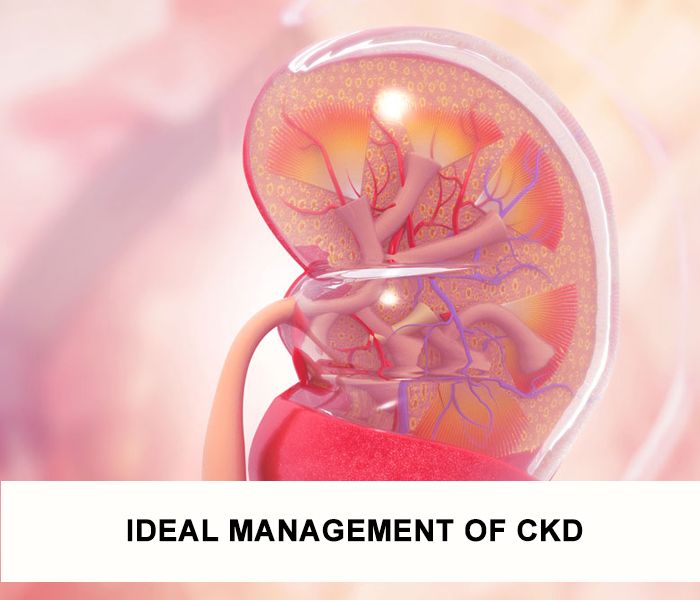
The diagnosis of chronic kidney disease (CKD) can seem overwhelming in the beginning, like someone has given you a puzzle with over half the pieces missing. But with the right approach, CKD can be managed in a way that allows you to live a full, rich life. It’s not about being perfect; it’s about making smart, enduring choices that benefit your kidneys and your general health. In this guide, here are the best ways to support your CKD care, from Ayurvedic treatment for CKD, diet, and exercise to mental health and partnering with your health care team. Let’s dive in.
CKD is a condition where your kidneys gradually lose their ability to filter waste and excess fluids from your blood. It’s often caused by conditions like diabetes, high blood pressure, or genetic factors, and it progresses in stages. The goal of managing CKD is to slow that progression, reduce complications, and keep you feeling as good as possible for as long as possible.
Think of your kidneys as the body’s cleanup crew. When they’re not working at full capacity, you need to lighten their load. That’s where lifestyle changes, medications, and regular checkups come in. It’s not just about your kidneys; it’s about protecting your heart, bones, and energy levels, too.
Diet is one of the biggest levers you can pull to manage CKD, but it doesn’t have to feel like a punishment. The key is to focus on kidney-friendly foods that are low in sodium, potassium, and phosphorus, while still being delicious and satisfying.
The trick is to work with a renal dietitian who can tailor a plan to your needs and preferences. Love pasta? They’ll find a way to make it work. Can’t live without dessert? There’s a kidney-friendly version of that, too.
Exercise might not be the first thing on your mind when you’re managing CKD, but it’s a game-changer. Regular movement improves blood pressure, boosts energy, and keeps your heart strong, all of which support your kidneys.
The goal is consistency, not intensity. Even a little movement every day adds up.
CKD often comes with a handful of medications to control blood pressure, manage blood sugar, or protect your bones. Taking them exactly as prescribed is crucial, even when you feel fine. Think of it as giving your kidneys a helping hand.
Regular checkups are just as important. Your doctor will monitor your kidney function through blood tests (like eGFR) and urine tests to catch any changes early. They might also check for anemia, bone health, or heart issues, since CKD can affect multiple systems.
Pro tip: Keep a journal or app to track your meds, symptoms, and questions for your doctor. It’s a simple way to stay organized and feel more in control.
Ayurvedic treatment for CKD has been making the waves and for the right reasons. CKD treatment in Ayurveda revolves around the use of herbs and therapies to treat the disease. Ayurveda aims at kidney failure treatment without dialysis, though a lot of work still needs to be done in this regard. The use of herbs like Punarnava, kasni, ashwagandha, etc., improves renal function, whereas therapies like Panchakarma are aimed at improving the overall health.
CKD isn’t just a physical condition; it can take an emotional toll, too. It’s normal to feel anxious, frustrated, or even a little scared. The key is to acknowledge those feelings and find ways to cope.
You’re not alone in this, and taking care of your mental health is just as important as managing your physical health.
Managing CKD is a team effort, and your healthcare team is your biggest ally. This includes your nephrologist, dietitian, primary care doctor, and maybe even a pharmacist or social worker. Be honest with them about what’s working, what’s hard, and what you’re feeling. They’re there to help you find solutions, whether it’s tweaking your diet, adjusting meds, or planning for the future.
Ask questions, too. What do your test results mean? Are there new treatments to consider? Knowledge is power, and understanding your condition helps you make informed choices.
CKD is a marathon, not a sprint, so it’s worth thinking about the future. In later stages, you might need to explore options like dialysis or a kidney transplant. These can sound daunting, but they’re tools to keep you thriving. Talk to your doctor early about what to expect so you can plan with confidence.
Managing CKD isn’t about giving up the things you love; it’s about finding balance. It’s okay to have days when you don’t get it all right. What matters is showing up for yourself, making small, intentional choices, and leaning on your support system. With the right tools and mindset, you can manage CKD and still live a life that feels rich and meaningful. If you feel that your CKD symptoms are severe, then consulting an expert like Karma Ayurveda for CKD treatment will be a good decision. Remember, self-medication can often lead to future health complications. Preventing disease in the first place is strongly recommended, though. Instead of asking, “What is the best medicine for kidney disease?”, ask, “How can I prevent renal diseases?” for better renal health.

Certificate no- AH-2023-0186
JAN 05,2023-JAN 04,2026
"Ayurveda is not just a system of medicine; it's a way of life. Connect with us to embrace a lifestyle that nurtures your body, mind, and soul."
Book Consultation Now